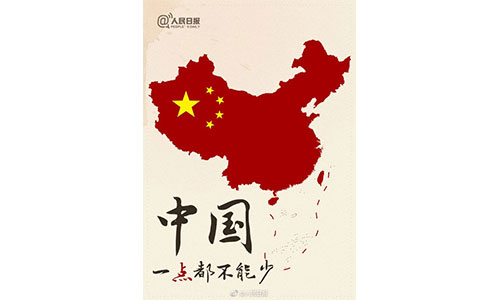
A map of China with caption reading "China without any part left out" Photo: People's Daily Sina Weibo account
Beijing will launch campaigns cracking down on "problematic" maps that threaten national unity, sovereignty and territorial integrity amid the two sessions.
Thirteen Beijing municipal departments, including the Beijing cyberspace administration, will launch the 2020 annual campaigns inspecting problematic maps, demanding that map compilation companies, map publishers and map users as well as online map service providers self-examine and rectify, said the Beijing Municipal Commission of Planning and Natural Resources.
Relevant departments will investigate maps that incorrectly portray China's territory, endanger national unity, sovereignty and territorial integrity, or harm the nation's security and interests. If the circumstances are serious, relevant people will face criminal punishment.
"Problematic" maps refer to those that do not portray China's territory correctly, covering the inclusion of the island of Taiwan, the national boundary lines on Taiwan Island, clear delineation of the Diaoyu Island and islands in the South China Sea, whether names of important islands are written properly in accordance with regulations and whether the representation of the dotted line in the South China Sea conforms to the relevant provisions.
The campaign will target news, publishing, film and television production companies, maps on curriculum materials for primary and middle schools, and online map service providers, it said.
Over the years, China has maintained a high-profile crackdown on incorrect maps. In March 2019, Chinese customs authorities in Qingdao, East China's Shandong Province, seized and destroyed 30,000 incorrect world maps, with problems including referring to Taiwan as a country and the incorrect depiction of the Sino-Indian border - the largest number to be disposed of recently.
China demanded 29 of the world's top 500 companies to rectify their online maps, which incorrectly portrayed China's territory, in the first half of 2019.
Incorrect maps have also been seen in movies, TV series and publications and some foreign companies.
German carmaker Audi apologized in 2017 for using an inaccurate China map at its annual press conference and Japanese electronics maker Kyocera apologized in 2018 for only showing half of China's territory on a map from its Chinese website.
Global Times
